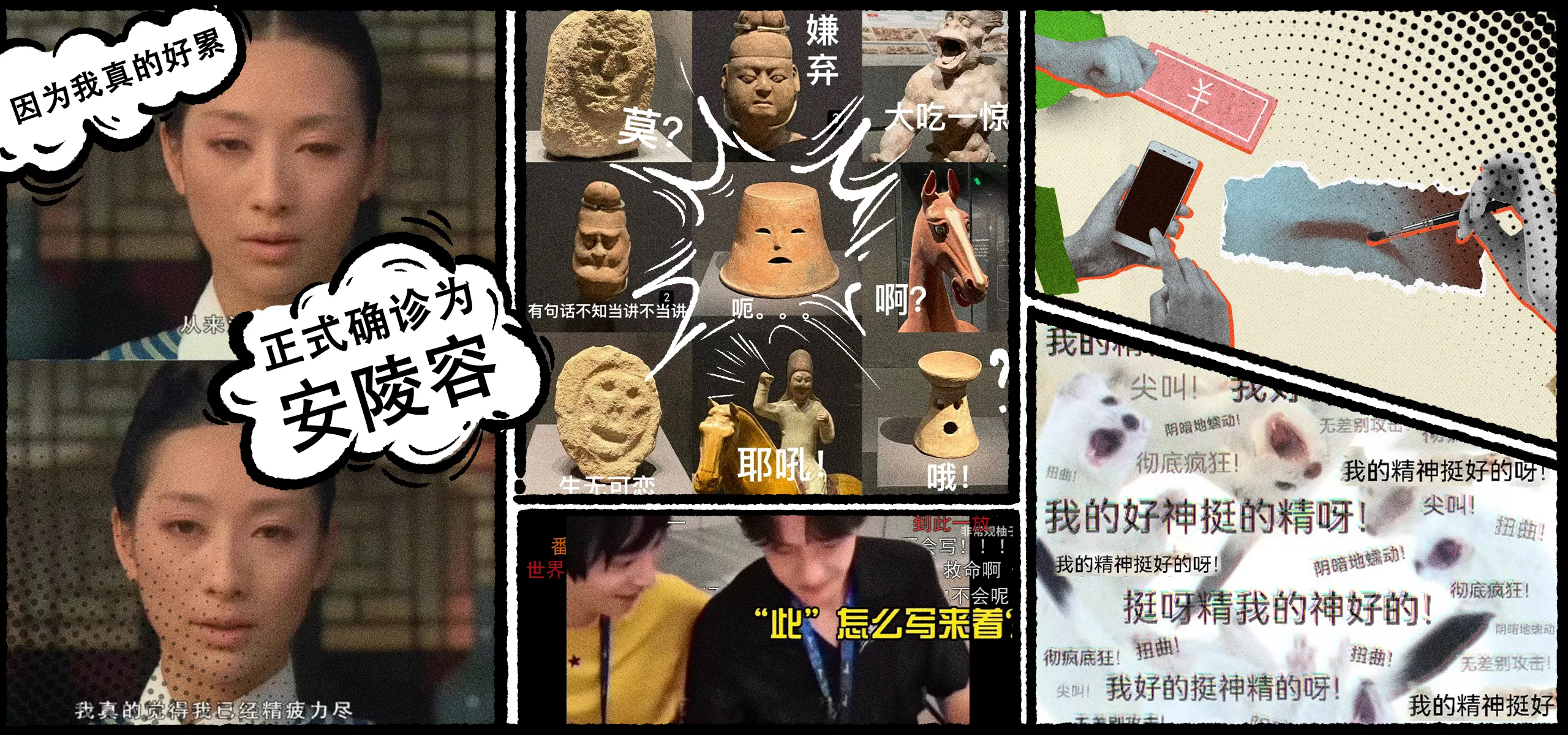In a year marked by a competitive job market and viral trends, here are the words and phrases that netizens coined to talk about it all
With the end of the three-year Covid-19 lockdowns and restrictions, the year 2023 has proven to be a vibrant and dynamic one, as people can finally embrace their normal lives—only at a faster pace.
As we reflect on the year, it’s impossible to ignore the cultural zeitgeist captured through the lens of memes and slang. These expressions not only provided comic relief but also a unique insight into the societal shifts and even economic trends that shaped the year. Here are some that caught TWOC’s eye in 2023.
Mental (in)stability
The discussion about “involution (内卷 nèijuǎn)” and “lying flat (躺平 tǎngpíng)” persists into 2023. Many young individuals find themselves trapped in a situation where they “feel too overwhelmed to continue with relentless competition, yet are reluctant to fully opt out (卷又卷不动,躺又躺不平 juǎn yòu juǎn bú dòng, tǎng yòu tǎng bù píng).” The significant ”mental burden (精神内耗 jīngshén nèihào)” compelled some to resort to “going crazy (发疯 fāfēng)” as a means of releasing pent-up emotion. Many wrote “madness literature (发疯文学 fāfēng wénxué),” another trending term in 2023.
As netizens quipped online: “Everyone goes a little crazy in life, it’s just a matter of enduring it (人活着哪有不发疯的,硬撑罢了 Rén huózhe nǎ yǒu bù fāfēng de, yìngchēng bàle),” and “Going a little crazy now and then can make work and life easier (有事没事发点儿疯,工作生活都轻松 Yǒushì méishì fā diǎnr fēng, gōngzuò shēnghuó dōu qīngsōng).”
At the close of 2023, netizens began adopting a dialect prevalent in the regions of Guangxi, Hunan, and Jiangxi as part of their online madness literature vocabulary. One phrase, “癫公癫婆 (diāngōng diānpó, insane man and insane woman),” became especially popular. In Chinese, 癫 denotes emotional disturbance characterized by abnormal speech and behavior, and “你发颠 (Nǐ fādiān)” has now become a new expression akin to “You are insane” on the Chinese internet.
One symptom of netizens’ “madness” is their reluctance to behave like typical humans (越来越不想当人了 yuè lái yuè bù xiǎng dāng rén le), with many increasingly finding themselves identifying with inanimate objects and fictional characters. The phrase “officially diagnosed as... (正式确诊为 zhèngshì quèzhěn wéi...)” has since gained widespread usage across the Chinese internet:
“Officially diagnosed as a test tube: hollow and brainless, easily manipulated, cheap to use, lying flat most of the time, occasionally functional, but ultimately fragile and brittle (正式确诊为一根试管:空心无脑,任人拿捏,便宜廉价,长期躺平,偶尔有用,脆皮易碎 Zhèngshì quèzhěn wéi yì gēn shìguǎn: kōngxīn wúnǎo, rènrén nániē, piányi liánjià, chángqī tǎngpíng, ǒu’ěr yǒuyòng, cuìpí yìsuì).”
Stress-free relationships
Rather than investing time and energy in forming deep relationships, young people, often burdened by work, now favor “shallow socializing (浅社交 qiǎnshèjiāo).” Many have resorted to friendships with no strings attached, or “dazi (搭子 dāzi),” to enjoy leisure time without pressure to commit to a long-term friendship.
Dazi are useful in all kinds of scenarios: form a “meal companion (饭搭子 fàndāzi)” to check out a new restaurant, a “travel buddy (旅游搭子 lǚyóu dāzi)” to split a hotel room or an “exercise partner (运动搭子 yùndòng dāzi)” for gym sessions.
One type of dazi many prefer these days is the 显眼包 (xiǎnyǎnbāo), or goofball. The term refers to people who stand out from the crowd and constantly seek attention. Although once considered a neutral term, it has gained a positive connotation recently, as many appreciate their vibrant energy in an often ultra-competitive society.
The ignorant celebrities
Wang Yibo, a 25-year-old Chinese actor with a huge fan base, was dubbed a “desperate illiterate (绝望的文盲 juéwàng de wénmáng)” by netizens earlier this year when he failed to answer some basic questions during various interviews. But Wang is far from the only celebrity that has been criticized for their ignorance as netizens dig deeper into their past. The term “Nine Escaping Fish (九漏鱼 jiǔ lòu yú),” short for “Fish escaping from the net of nine-year compulsory education (九年义务教育的漏网之鱼 jiǔ nián yìwù jiàoyù de lòuwǎngzhīyú),” has since been created to mock them for being seemingly less educated than junior high school graduates.
Li Jiaqi, China’s livestream-selling king, has also seen his popularity decline this year after he chastised a viewer who complained about the price of an eyebrow pencil Li was promoting.
Li’s lecture came during one of his livestream events: “How is it expensive? Sometimes, you should look at yourself: Have your wages increased in all these years? Have you been working hard. (哪里贵了?有的时候找找自己的原因,这么多年了工资涨没涨,有没有认真工作?Nǎlǐ guì le? Yǒude shíhou zhǎozhao zìjǐ de yuányīn, zhème duō nián le gōngzī zhǎng méi zhǎng, yǒu méiyǒu rènzhēn gōngzuò?)”
Li’s speech touched a nerve with young netizens who have faced uncertain economic prospects over the last few years. Many sarcastically turned the character 里 (lǐ) into 李 (Li Jiaqi’s surname) in the phrase “How is it expensive (哪里贵了 Nǎlǐ guì le)?” and applied it to describe people who have lost humility after achieving success.

















